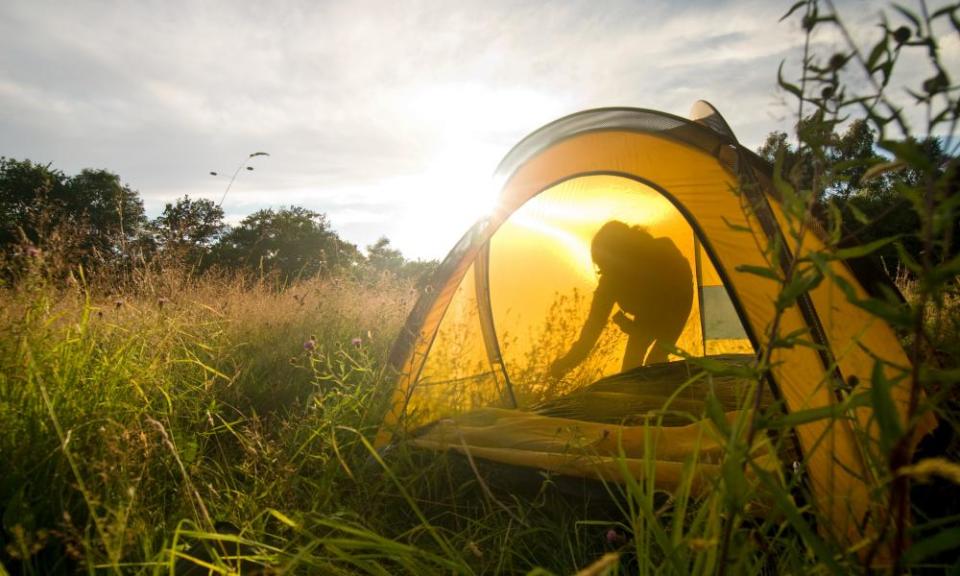Just camp in my garden: new websites offer private pitches

You’ve done glamping, you’ve tried wild camping, but are you ready to embrace camping in other people’s gardens? A new travel website launching this month may just push more of us to do so, with its collection of pitches on people’s lawns and private land.
About 100 gardens, fields and outdoor spaces in the UK will be available to book from £20 a night on wildpoint.com from the end of July, with more to be added after. More than 4,000 hosts have applied. Hosts must have at least 0.2 hectares (0.5 acres) of space to be selected, provide use of a toilet and will usually greet guests. Some may offer extras such as packed lunches, cooked breakfasts and bundles of firewood.
Gardens are generally large, attractive country affairs, rather than small city lawns, and options include a leafy space in the village of Mickleham in Surrey, within walking distance of two pubs, and one in Yorkshire, where campers will wake to 180-degree views of the North York Moors, Howardian Hills and Yorkshire Dales.
Needing to use a campsite defeats the point of having a campervan
Grace Fell, Wild With Consent
Founder Oliver Windle said he was aiming to fill a gap in the market for an obvious go-to platform for camping pitches in the UK.
While there are numerous slick glamping websites – such as CanopyandStars.co.uk and CoolCamping.com – he argues that the rest of the camping industry has “become antiquated” in terms of design and technology.
The website will also feature proper campsites, tipis, yurts and pitches in unusual locations such as vineyards.
Wild Point isn’t the only new travel venture opening up private spaces to campers. Also launching this month is Wild With Consent, a web platform that allows campervan and motorhome users to book remote pitches on private land in Northumberland.
Only one campervan is allowed in each spot per night, and locations (12 at present) are chosen for their beauty, lack of light pollution and noise, and sense of isolation.
One coastal spot on the edge of Lindisfarne nature reserve has views to Holy Island, another lies in a secluded spot on the banks of the River Till.
The website’s founder Grace Fell was inspired by wild camping trips in Scotland, where the right to roam allows people to camp anywhere they like, unlike in England, Wales and Northern Ireland, where it is illegal to camp without the landowner’s permission, apart from on certain parts of Dartmoor. To Fell, needing to use a campsite “defeats the point of having a campervan”.
The idea is to provide a liberated experience akin to wild camping, with more privacy than a campsite, but with the reassurance of knowing permission to be there has been arranged in advance. Of course, unlike wild camping this means there is a cost: between £25 and £100 a night.
The service only covers Northumberland, chosen because it is Fell’s home county, and because, she says, “it is genuinely wild, with the lowest population density in England”.
But she hopes to roll out the concept to other areas of the UK.
Hundreds of temporary campsites have opened since last summer to cater to the surge in interest
There is certainly a demand. Last summer wild camping became so popular it was temporarily banned on Dartmoor due to the impact of those ignoring “leave no trace” guidance, and Lake District national park officials fined hundreds of people who were wild camping there illegally. With holidays within the UK booming, many campsites have long been booked up for the season, while hundreds of pop-up, temporary campsites have opened since last summer to cater to the surge in interest.
Services that help campers find pitches on private land aren’t new. Many British campervanners use the Brit Stops guide (£28), a book listing 1,000 hosts, from pubs and vineyards to museums and antiques centres, that allow them to park up for a night.
A UK website, campinmygarden.com, created in 2011, is now defunct, but Campspace.com, which launched in 2017 in the Netherlands, offers pitches in private gardens around the world, including about 50 in the UK, and Homecamper.com is going strong with 58,000 pitches in private gardens, parks and private land around the world.
One UK-focused website, nearlywildcamping.org, collates pitches on private wildflower meadows, woodland and heathland across the UK. Members pay £20 to access a list of 160 pitches, many of which are exclusive to the website, including some that allow campervans.
Borrowing privately owned campervans rather than hiring them is another growing trend, with websites such as GoBoony.com, yescapa.com, and camptoo.co.uk facilitating the exchange. They report a significant increase in users since last summer.
In what’s set to be another bumper year for UK accommodation providers, all these services are sure to be a valuable extra resource to mine for that elusive holiday availability.

